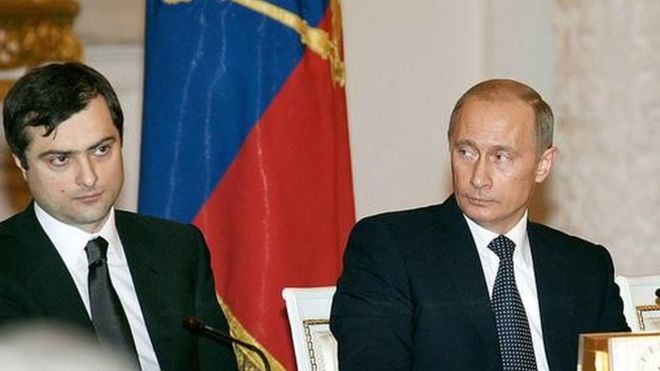
Russian President Vladimir Putin has dismissed one of his closest advisers, Vladislav Surkov.
The secretive strategist was known as the grey cardinal in Russia due to his perceived influence on the president behind the scenes.
He was widely seen as an aide who helped Mr Putin cement his hold on power.
Mr Surkov oversaw policy towards Ukraine, but was recently relieved of some of that responsibility.
Dmitry Kozak, a political veteran and close ally of the president, took over the Ukraine role earlier this month.
The Kremlin did not make it clear whether Mr Surkov would be given a new position.
A statement on its website also gave no indication as to why he had been dismissed.
This may not be the last we hear of Surkov
Gabriel Gatehouse, international editor, BBC Newsnight
There was a time, at the height of his powers, when nothing could happen in Russian politics without the hand of Vladislav Surkov being in some way detected behind the scenes.
He controlled political parties in the Duma, and pro-Putin youth groups on the streets. He supported artists who opposed the Kremlin’s policies; indeed, many suspected he controlled the political opposition too.
By turns erudite and irascible, he drew on a wide range of cultural references – from western media theory to Beat poetry and gangster rap – all the while centralising power for himself and his boss.
His first fall from grace came during mass protests against Mr Putin’s rule in 2011-12. His air of omnipotence was so complete, his inability to control the streets looked to many like failure, or worse: treachery.
When he resurfaced, as the man effectively running Russia’s war in eastern Ukraine, those who knew him well sensed a restless man with diminished powers – a “golden cage” was how one former friend described his new role. Now that, too, is gone.
But this isn’t the first time Mr Surkov has been sacked. It may not be the last.
Who is Vladislav Surkov?
As first deputy head of the Kremlin administration, Mr Surkov oversaw political parties in parliament and electoral campaigns that delivered victory for Mr Putin.
But his influence began to wane in 2011, when he was made a deputy prime minister.
In 2013, he was given the responsibility of overseeing Russia’s ties with Ukraine and other post-Soviet countries.
Moscow annexed Ukraine’s southern Crimea peninsula in 2014 and supported Russian-speaking separatists in Ukraine’s east.



